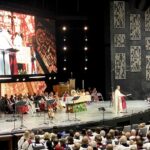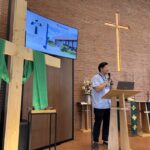With the gay rights movement getting old and the transgender movement in full swing, religious leftists are now moving on to bisexuality. To that end, Episcopal LGBTQ advocate Marie Alford-Harkey of the Religious Institute recently hosted a webinar stressing the need for more bisexual-friendly churches.
After defining a bisexual as one who has an “enduring romantic, emotional, and sexual attraction to people of more than one sex or gender,” Alford-Harkey noted that bisexuals constitute the LGBT’s largest demographic (40%) and at least 25% of transgendered demographic. Additionally, she noted that anywhere between 1.2-16% of the general population identify as bisexual, depending on which statistical methods are employed. She was quick to point out that simply being in a straight, married relationship does not rule out the possibility of a bisexual orientation. Finally, Alford-Harkey asserted that the only criterion one has to meet to be considered “bisexual” is to claim the identity.
Alford-Harkey claimed that this pro-bisexual initiative is made necessary by the fact that bisexuals carry a greater rate of risky physical and mental behaviors, which are products of a biphobic society’s oppressive prejudices, rather than a flaw in their lifestyle. She then ran through a list of “myths” about bisexuals, namely that they are greedy, are in transition to homosexuality, and are more promiscuous than their straight and gay counterparts.
Biphobia emanates from both the Faith and the Gay and Lesbian Communities, as they both reject the existence of the bisexual orientation. In fact, Alford-Harkey is critical of the term “gay marriage,” because it glosses over the bisexual identity.
To combat this biphobia, she calls for “bisexually healthy congregations,” which are welcoming, affirming, and “privilege” no sexual orientation over another. They also celebrate sexual diversity through the mediums of preaching and worship, emphasize that sexuality is a gift, and make sure church leaders are okay with discussing the issue. Churches must provide congregational support for adolescents who seek to nail down their sexual identities. They must also supply pastoral care for bisexuals through the medium of referrals to bi-inclusive therapeutic services, rather than those that recommend a change in their lifestyle.
A significant component of these “bisexually healthy congregations” is what Alford-Harkey calls “Biblical texts engagement.” This involves transcending the refutation of the so called “clobbering passages”-scriptures that unambiguously declare LGBT activity to be evil. It calls for emphasizing texts that remind everyone that all people are loved by God and are made in His image (Gen 1:26) and demands greater attention to texts emphasizing love and justice (Micah 6:8).
When covering passages that describe Jesus reaching out to societal outsiders, churches must apply “liberative interpretations” to include people with diverse sexual identities among the marginalized. Churches should also stress texts that highlight the fact that there is no male or female but all are one in Christ (Gal 3:28). Finally, ministers must bring to mind the variety of intimate relationships recorded in the Bible, such as David’s bisexual intimacies with Jonathan and Bathsheba. In the same breadth of offering this counsel, Alford-Harkey noted that the ancient Jews never saw themselves as queer. This does not matter, she said, because the biblical narrative provided no commentary on the relationships; people have just read in their “discomfort” with such relationships into the text.
According to Alford-Harkey, these and other pro-bisexual measures will allow for more complex reflection and a deeper understanding of God.
David once asked “If the foundations are destroyed, What can the righteous do?” (Psalm 11:3 NASB).
Not much.
They certainly can’t contain the perverse imaginations that are read into the scripture, many of which were on display in both the presentation and the Q&A.
One commenter charged that Alford-Harkey employed “binary political undertones” simply by using the words “opposite sex.” Rather than challenge this ridiculous assertion, Alford-Harkey apologized for using the term, saying it was a slip of the tongue and that she never uses those words in writing or typical speech for that very reason.
Another audience member claimed to struggle with his white “cisgendered” male “privilege” and his queer identity. Alford-Harkey counseled that he celebrate the latter and wrestle with the former.
Lost on everyone involved was the fact that this sexual libertinism is politicizing every aspect of their lives-including their sexuality.
But the most outrageous comment came from one viewer who suggested that Christ’s love for both God and man can be viewed as a bisexual relationship.
This was met favorably by the moderator, who reacted by invoking Marcella Althaus-Reid’s The Queer God, which according to its description is an attempt to
“mark the search for a different face of God – the Queer God who challenges the oppressive powers of heterosexual orthodoxy…[and]…to liberate God from the closet of traditional Christian thought.”
Did I mention it presents the Trinity as a “divinised orgy” (Althaus-Reid, 33)?
As the sexual revolutionaries continue to roll back the Biblical sexual regulations, we can expect this type of outrageous eisegesis to increase and expand. By reserving the right to read her pro-bisexual sentiments into the scriptures in defiance of their original intent, Alford-Harkey has helped lay the groundwork for people who want to do the same with other sexual deviances, like incest or bestiality.
When the foundations are destroyed the possibilities are endless, but none of them are righteous.





Comment by truelinguist on June 26, 2015 at 11:30 am
Bisexual – meaning, adulterous with both sexes.
These churches are going to hell, literally and figuratively.